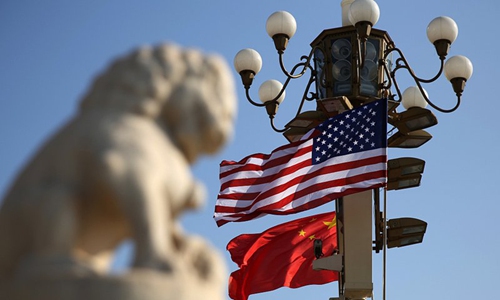Fate of phase one trade deal implies future of relationship
Source:Global Times Published: 2020/5/10 19:53:40

File photo
US President Donald Trump's recent comment over the phase one trade deal created new uncertainty that will likely worsen US-China economic relations in the coming months.In an interview on Fox & Friends on Friday, Trump said that he has yet to make a decision on the fate of the trade agreement with China. Trump seems to have every reason to feel "very torn" to make a policy choice. While a recent conspiratorial firestorm in Washington that claimed to punish China over COVID-19, has fueled a deterioration in US-China relations, a conference call between top trade officials from the two countries indicates good progress is being made on the trade deal.
Given various voices shadowing the bilateral relationship, China needs to keep vigilant against the risk that the phase one trade deal may fall apart, because that would mean a return of US-China relations to something worse than the trade war.
To a large extent, the future of the relations between China and the US will hinge on whether the US could contain COVID-19 at the earliest possible time and whether its economy could sustain the shocks of the unprecedented health crisis. If the US could manage to avoid an economic collapse, the trade agreement may keep kicking in, which could somehow cushion the fraught US-China relations.
Nevertheless, there is also the possibility that the US economy dives and spirals into a depression like the one in the 1930s, and Trump may spare no effort to pass it back to China. And once his team chooses to follow a radical re-election plan by imposing more sanctions over trade with China, then bilateral relations will inevitably deteriorate, and could go beyond a mere trade confrontation, and both will face a situation worse than the previous trade war.
In the past, China has always adhered to the principle of reciprocity and exercised restraint in taking any countermeasures so as to avoid undermining the economic and trade foundation of bilateral relations. But if the US adopts harsher economic sanctions or refuses to deliver on interest and principal payments of China's nearly $1.1 trillion holdings of US Treasury bonds, China will not hesitate to upgrade its response.
China has its own trump cards but has not really taken any retaliatory measures yet on a spate of fronts: rare earth export, and American companies' interests in the Chinese market, among others. If Washington continues to drum up the conspiracy theories, or moves to scapegoat China to demand so-called "compensation" and impose more sanctions, there would be ways to have US companies in China to "pick up the tab," even though it would be the least thing both sides like to see.
The Trump administration is now at a crossroads as to how to handle its relationship with China, and the future US-China relations will be decided by what their next step will be. Although the Chinese economy has been hit by the COVID-19 epidemic, it clearly bottomed out in the first quarter, and now continues to stabilize. By comparison, the US economy is still far from returning to normalcy and is even in danger of a meltdown amid the spreading coronavirus. Anyone with a sense would know it is not the time for the US to have a head-on confrontation with China.
Posted in: GT VOICE